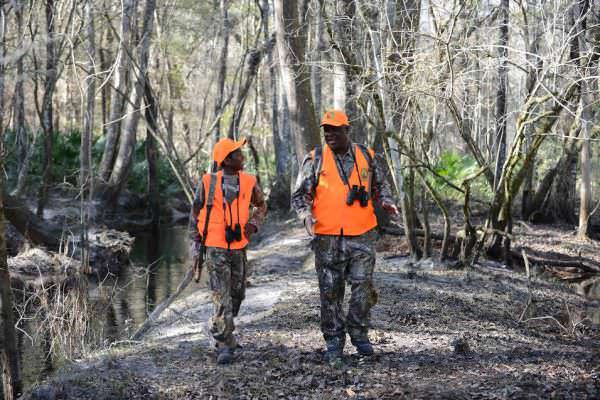
 USA -(Ammoland.com)- Divisiveness will be the downfall of the outdoors heritage.
USA -(Ammoland.com)- Divisiveness will be the downfall of the outdoors heritage.
Animal-rights organizations prey upon differences of opinion in our ranks, and use it to justify their legislation, court arguments and ballot initiatives. Their sway with non-hunting voters only increases when we repeat similar statements and narrow-minded opinions.
With that said, here are the top-three most absurd statements, arguments and stances from hunters, non-hunters and anti-hunters.
- “Endangered” Animals
Hunting endangered animals seems like a no brainer – everyone should agree. But what constitutes “endangered”? Certainly, listing under the protections of the Endangered Species Act would be the easiest indicator. Or would it?
Animal-rights groups love to invoke emotional words such as “endangered,” “iconic,” “extinction” and “vulnerable” (usually in conjunction with equally emotional words such as slaughter, senseless and trophy), while resisting actions to remove any game animal from listing (notice they don’t fight removal of non-game animals whose populations reach delisting thresholds). This holds true for animals overseas such as lions and leopards, as well as domestic animals such as wolves and grizzly bears.
What we can do: When it comes to apex predators and removal from an endangered listing, even some hunters hesitate to advocate for management that includes hunting. That’s a mistake hunters should resist with science. Population management takes place at a very local level, and harvest goals are tallied with overall populations, birth and natural mortality rates.
Sportsmen should advocate for the removal of recovered domestic species from the endangered species list, while also supporting regulated hunting of species with monitoring of population levels as required by law.
In foreign countries, regulated hunting of threatened species is often the best, sometimes only, means to fund conservation, protection and enforcement programs, such as habitat and population studies, fences for preserves, anti-poaching teams and prosecution.
Two examples that the Sportsmen’s Alliance are involved in: delisting of Greater Yellowstone grizzly bears; the population has been above delisting standards by more than 25 percent for twice as long as necessary. Additionally, Great Lakes wolves have far surpassed population thresholds for delisting (as high as 12 fold), and it’s been a decade-long legal battle that still rages today.
The ruling and idea that these populations are endangered in these specific areas is ridiculous. It’s akin to saying pheasant hunting shouldn’t take place in South Dakota because the birds aren’t plentiful enough in South Carolina, or that halibut fishing shouldn’t take place in Alaska because Florida doesn’t have any.
2. “Trophy” Hunting
The catch-all phrase for conveying a totality of evil in the outdoors, “trophy hunting” has become the animal-rights movement’s go-to descriptor to stop everything from lion hunting in Africa to black bear hunting in Kentucky. The media echoes the use of trophy to paint any hunting as nothing more than a pursuit of heads, horns and hides. As planned, non-hunters are almost immediately swayed to stand against whatever act the words were uttered against.
What’s worse, however, is that many hunters use the same logic, and apply it to everything from predator to deer hunting. Whether it’s simply justification for taking younger/smaller animals or it makes them feel somehow ethically superior is hard to say. But the effect is the same: there are two classes of hunters, and only one has the moral high ground. And that’s a very dangerous position for anyone in the outdoors to take.
What we can do: Stop using the term “trophy hunting” to denote a choice to hunt different specimens of any given species. A trophy is in the eye of the beholder; a person’s first animal (which is usually small game, a bird or female or young big game) is as memorable to them as another’s record-book animal.
Further, the connotation that just because an animal is mature and has desirable qualities (large antlers, long beards or beautiful plumage) that it is somehow undesirable or inferior to eat is a fallacy. They’re not mutually exclusive concepts – an animal can be, and typically is, both a mature “trophy” and a great dinner.
3. Killing Only to Eat
Animal-rights organizations know they lose the moral high ground when they condemn nutrition-deficient populations for hunting, such as the poor or subsistence hunters. But somehow the idea of consumption has become the default for acceptable hunting by everyone – including some hunters.
The idea that it’s only acceptable to kill an animal if you eat it is the most idiotic statement made by hunters. It plays into the hands of the animal-rights crowd by, once again, dividing hunters and undermining wildlife management.
What we can do: Stop espousing consumption as the only moral high ground for hunting, and instead promote the fact that hunting itself is the moral high ground that keeps a healthy balance in nature and funds conservation. Hunting is a tool used by biologists to balance populations of predators and prey with the available habitats within an area.
Hunting of animals not suitable for eating maintains an acceptable balance within limited habitats. The idea that consumption must take place ignores the facts that some species negatively impact habitats, carry disease or are undesirable table fare (but still must be removed from the equation) – beavers, raccoons, opossums, prairie dogs and coyotes are but a few examples.
About the Sportsmen’s Alliance:
The Sportsmen’s Alliance protects and defends America’s wildlife conservation programs and the pursuits – hunting, fishing and trapping – that generate the money to pay for them. Sportsmen’s Alliance Foundation is responsible for public education, legal defense and research. Its mission is accomplished through several distinct programs coordinated to provide the most complete defense capability possible.
Stay connected to Sportsmen’s Alliance on their website, Facebook, Twitter and Instagram.
